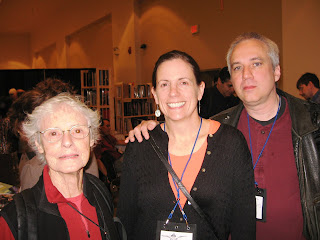Just when I was beginning to get nostalgic for colorful (if regrettable) Alabama politics, along comes the 2007 mayoral election in Ridgeley, W.Va., just across the river from nearby Cumberland, Md. Here's the story thus far, as covered by the
Cumberland Times-News.
A month before he hoped to be re-elected, two-term incumbent Mayor Mitchell Reeves was arrested on a charge of driving without a license. He said he just forgot to renew it when it expired years ago.
A month later, on the Friday before the Tuesday election, Reeves was arrested again, on fraud charges, and this time was sent to jail. He was charged with loading a trailer with personal belongings in an attempt to hide them from his creditors and from the county officials who planned to sell them to satisfy a $200,000 lien against Reeves.
From the jail, the mayor allegedly called Ridgeley Police Chief Mike Miller and told him to bring him a manila envelope the mayor had stashed in a filing cabinet at town hall. With the help of town clerk Melinda Liller, the chief found the envelope, which he said contained $6,800 in cash.
Instead of delivering the cash to the jailed mayor, the chief said he made some phone calls soliciting legal advice, and decided the cash -- like all the mayor's property -- was the county's and not the mayor's until the lien was satisfied. So he handed it over to the magistrate instead.
All that happened Friday. On Sunday, during a phone call he allegedly placed from jail to Councilwoman Faye Lemley at city hall, the mayor fired both the police chief and the clerk, apparently for not bringing him the $6,800.
"I came down and opened up the file cabinet," the ex-clerk told the
Cumberland Times-News. "That's why I was fired."
"The mayor has been acting above the law for years," the ex-chief told the
Times-News. "He never did have a West Virginia license."
That Tuesday, Reeves was still sitting in jail when the citizens of Ridgeley went to the polls and voted 5-to-1 for Reeves' opponent, veterinarian Richard Lechliter, a member of the Town Council. Lechliter got 185 votes to Reeves' 34.
One of the likely anti-Reeves voters was Mae Schartiger, who came to the polls on her 100th birthday. Schartiger, who said the first vote she ever cast was for Herbert Hoover, voted this time around to restore respectability to her hometown, she told the
Times-News.
Also voted in was Liller, the fired clerk, who was elected town recorder.
Voted out, meanwhile, was Councilwoman Lemley, despite her diligence in reporting to city hall on a Sunday to receive vengeful instructions from a jailed mayor.
The mayor-elect pledged to give both the chief and the clerk their jobs back and to clean up city hall.
While all this was going on, I happened to be reading, and hugely enjoying,
They Love a Man in the Country: Saints and Sinners in the South by Billy Bowles and Remer Tyson, a 1989 collection of colorful anecdotes about mid-century politicians and other power brokers. If there's ever a sequel, someone should interview Mitchell Reeves, soon to be ex-mayor of Ridgeley, W.Va.
 F. Brett Cox sees justice done.
F. Brett Cox sees justice done. David Hartwell as Medusa.
David Hartwell as Medusa. Convention chair Joseph Berlant, whose fault it all was.
Convention chair Joseph Berlant, whose fault it all was. Nicholas DiChario.
Nicholas DiChario. Gardner Dozois.
Gardner Dozois. Scott Edelman looks for himself (successfully) at Spa City Comics.
Scott Edelman looks for himself (successfully) at Spa City Comics. Bernie Goodman.
Bernie Goodman. Cousin Hal Duncan.
Cousin Hal Duncan. John Langan.
John Langan. Glennis LeBlanc.
Glennis LeBlanc. Mark Wingenfeld.
Mark Wingenfeld. Gordon Van Gelder makes an editorial comment.
Gordon Van Gelder makes an editorial comment. Ted Chiang.
Ted Chiang. Byron Tetrick.
Byron Tetrick.
 Darrell Schweitzer, rightly wary of being photographed by an interviewee.
Darrell Schweitzer, rightly wary of being photographed by an interviewee. Allison Baker.
Allison Baker. Rani Graff.
Rani Graff.




























